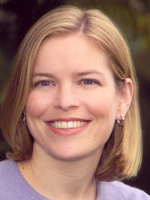Maggie Leffler on Writing Amidst Tragedy
The publication of your first novel is supposed to be a time for celebration, but for Maggie Leffler, life is a bit more complicated. In this essay, she talks about writing and publishing The Diagnosis of Love while coping with the loss of two of her greatest inspirations.

My husband tells me that there is an American Indian expression, “Hoka hey,” which means today is a good day to die. It’s a statement of preparedness, not of wishful thinking. Greet each day as if it were your last, because there might not be a tomorrow. As a physician who deals with death on a regular basis, and as a daughter whose mother was diagnosed with ovarian cancer in my third year of medical school and died before my graduation, I’ve been regularly reminded of just how fragile life is—it’s just that sometimes I don’t want to be reminded.
My mother was a doctor, as well as a writer. The same year that she died, she was working on a mystery novel, while I would work on the manuscript that eventually became The Diagnosis of Love. I would take off from medical school, and we’d sit, side by side, tapping away on our laptops, and then compare chapters. We were each other’s harshest critics and biggest fans. The year that she was sick, I wrote furiously, as if we were both dying of cancer. The year that she died, I kept writing at the same pace, both to save myself from my grief and because the characters had become my old friends. They’d seen me through the worst and kept me laughing. Even my mother knew them intimately. I had to see the story through.
“Seeing it through” meant applying to the Iowa Writers Workshop and not getting in, joining a local writers group instead, and ultimately, writing six more drafts over the next seven years. The perseverance paid off: When I got an agent, she sold the book to Bantam within two weeks. Joy! A year later, the advance copies were in, and I sent one to my father, complete with “Cliff’s Notes” of which characters were completely imagined and which characters had been inspired by a real person. (“As if I couldn’t tell,” he said, chuckling).
For a couple of weeks, I waited, nervously, to see what he thought. His opinion meant more to me than any Publishers Weekly review (although that was nice, too). My father, a pediatrician, had brought me along on home visits, when I was a child. As a med student, I shadowed him in the office. Out of residency, I called him with any of my pediatric quandaries. When he did finally call about my novel, his voice sounded thoughtful.
“My only fear is that by revealing your main character’s insecurities about the practice of medicine, none of your readers will see how valuable the young lady really was both to her patients and to her profession,” he said. I told him that I thought the reader would get it. Inside, I was pleased: My father thought I was a good doctor.
Two months later, near the end of February, The Diagnosis of Love hit the shelves. On March 3, my family got together in Pittsburgh to celebrate the launch. On March 5, my father was on his way to see a patient at the hospital and was killed by a drunk driver.
A friend said that, according to the Talmud, you aren’t supposed to ask a grieving person, “How are you doing?” for the 30 days after their loved one has died. I appreciate the wisdom and would extend that custom to at least a year after a tragedy such as this.
I will say that my parents’ lives have inspired me. My mother told me: Go after your dreams, no matter how many times someone tells you that you can’t do it. My father told me: Figure out what you love and then do it. He loved seeing patients, loved making hospital rounds, he even loved driving to various hospitals. Some of our best conversations were on the road. And from the outpouring of letters, it is evident that he made a difference every single day, not just in our family, but in our community as well.
When I got the news that the book was going to be published, many people, mostly colleagues, asked if I planned on quitting my day job. The answer is no. The truth is, I can’t imagine writing novels without the balance of practicing medicine and vice versa. I am following my parents’ advice and their examples. Hoka hey.
23 April 2007 | guest authors |

 Our Endless and Proper Work is my new book with Belt Publishing about starting (and sticking to) a productive writing practice.
Our Endless and Proper Work is my new book with Belt Publishing about starting (and sticking to) a productive writing practice. 
